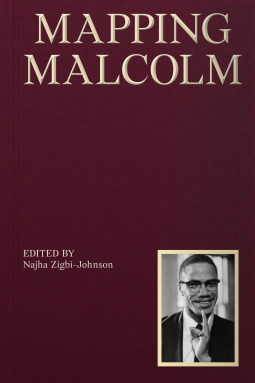
Mapping Malcolm
by Najha Zigbi-Johnson
This title was previously available on NetGalley and is now archived.
Send NetGalley books directly to your Kindle or Kindle app
1
To read on a Kindle or Kindle app, please add kindle@netgalley.com as an approved email address to receive files in your Amazon account. Click here for step-by-step instructions.
2
Also find your Kindle email address within your Amazon account, and enter it here.
Pub Date 27 Aug 2024 | Archive Date 4 Sep 2024
Talking about this book? Use #MappingMalcolm #NetGalley. More hashtag tips!
Description
With contributions from Maytha Alhassen, Joshua Bennett, Christopher Joshua Benton, Lisa Beyeler-Yvarra, Stephen Burks, Guy Davis, Ossie Davis, Ibrahem Hasan, Albert Hicks IV, Marc Lamont Hill, Ladi’Sasha Jones, Jerrell Gibbs, Nsenga Knight, Akemi Kochiyama, Denise Lim, Jaimee A. Swift, James A. Tyner, Marcus Washington Jr., and Darien Alexander Williams.
Available Editions
| EDITION | Other Format |
| ISBN | 9781941332832 |
| PRICE | US$28.00 (USD) |
| PAGES | 304 |
Available on NetGalley
Featured Reviews
 Miles L, Educator
Miles L, Educator
Mapping Malcolm, edited by Najha Zigbi-Johnson, offers the reader insight into not simply Malcolm X's thought but some of the structural elements, both physical and organizational, that helped shape his thought and his activism.
This is definitely a book that will reward revisiting multiple times. You can read this with the idea of better understanding the man and his ideas and be richly rewarded. Yet you will find yourself thinking about how where we live (and the societal structures within which we live) speaks to our place within society more broadly. How much of our ending up where we are was actually personal decision and how much was structured by larger relatively unseen (or at least unrecognized) societal or cultural forces?
If you come to this book less for what it might offer for your own activism and more to simply understand Malcolm X, you'll get a wonderful glimpse at the things that make his legacy so enduring. He never stopped learning and growing, he was about people first and foremost, relationships between individuals and groups played a large part (often with him as the primary conduit). His growth and quest for knowledge was never for knowledge in and of itself but knowledge in service to people. Namely marginalized people within an often-hateful society but knowing that a society that could serve all people would be a better society for all people made this approach essential.
Far too often people's perception of Malcolm X is based on a snapshot of his life, taken at one point and usually without looking at the bigger picture. While this volume won't change those who are determined to cling to narrow opinions, this will help those wanting to understand him and his ideas with an eye toward carrying those ideas forward.
I found myself really drawn to a playlist that is one of the essays included. Partly because I think music can speak volumes and connect the emotional with the rational (not to imply they are totally separate) but more because the essay gives great insight into these works. Definitely take the time to find these and listen.
Reviewed from a copy made available by the publisher via NetGalley.



